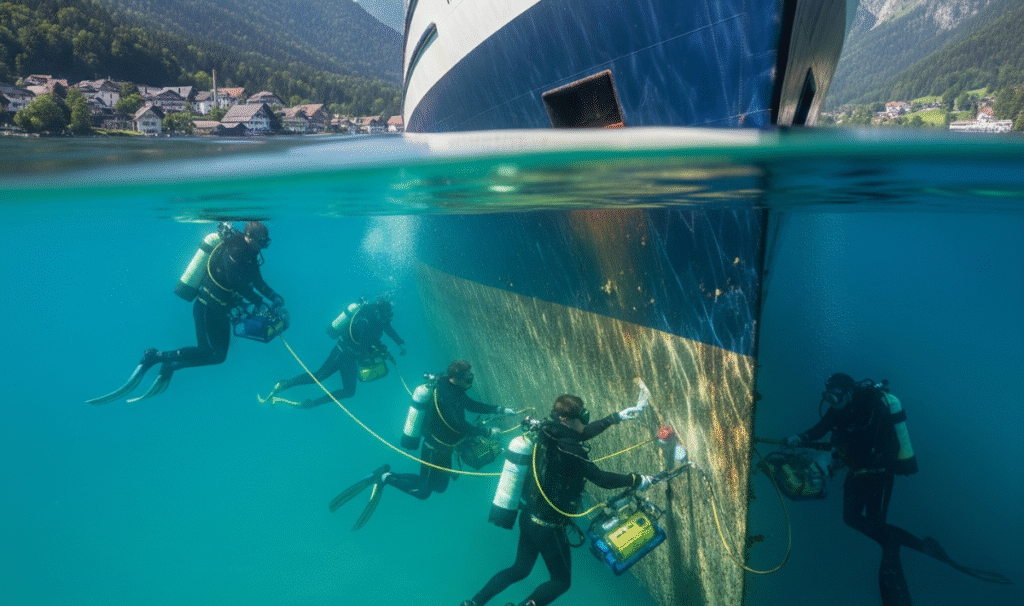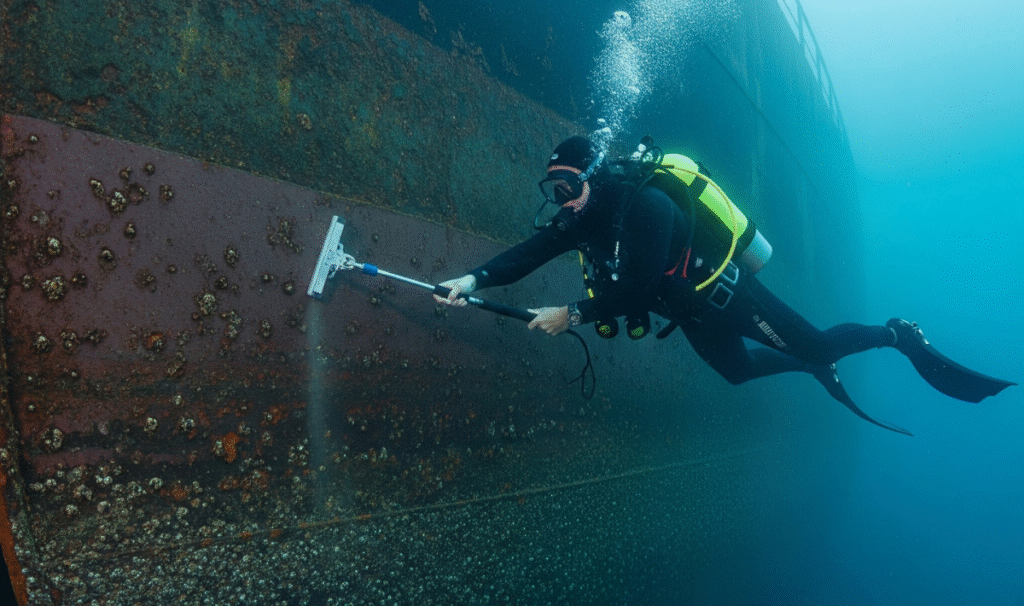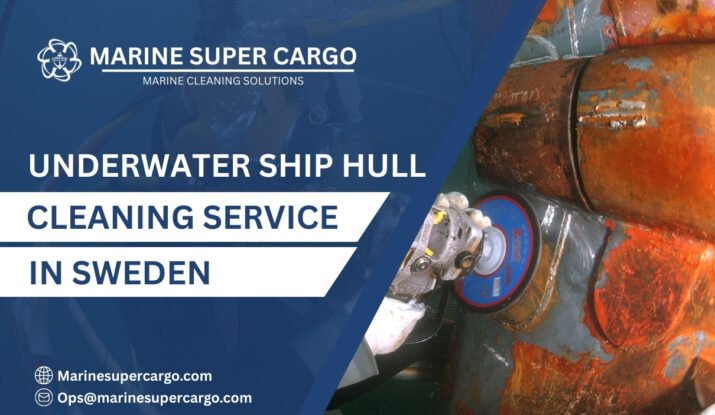When most people picture shipping, they imagine vast cargo ships gliding across the seas with precise coordination. But what many don’t see is the underwater world clinging to those ships’ hulls—barnacles, algae, and stubborn marine organisms that hitch a ride. Over time, this slows ships down, drains their fuel, and erodes their profits. That’s where underwater ship hull cleaning in Sweden becomes the unsung hero. In the Scandinavian waters, hull cleaning is not just about maintenance—it’s about efficiency, sustainability, and long-term cost savings.
The Meaning of Hull Maintenance
Hull maintenance refers to the vital practice of cleaning a ship’s submerged surfaces to remove marine growth, sediment, and early signs of corrosion. Unlike traditional dry-docking, which is costly and time-consuming, modern hull cleaning is performed directly underwater. Skilled divers or advanced robotic systems use specialized equipment to restore hull smoothness, improve vessel efficiency, and extend coating life. This proactive maintenance approach minimizes operational downtime, reduces expenses, and ensures ships remain seaworthy, fuel-efficient, and compliant with international maritime standards.
Why Sweden’s Waters Make Cleaning Unique
Unlike warm tropical seas, Sweden’s northern climate and brackish Baltic waters mean biofouling grows differently—sometimes slower, but thicker in colder pockets. That makes underwater ship hull cleaning in Sweden a specialized service tailored to these local conditions.
How Biofouling Affects Ship Performance
Think of biofouling as sticky mud clinging to your running shoes. You’d instantly feel heavier, slower, and less efficient. For ships, even a thin layer of marine growth increases drag. According to imo.org, biofouling can raise fuel consumption by as much as 30–40%.

Tangible Fuel Savings and Green Operations
By scheduling regular underwater ship hull cleaning in Sweden, shipowners see major returns: smoother voyages, faster turnaround times, and drastically lower fuel bills. Cleaner hulls make ships run like a freshly sharpened blade through water—efficient and sharp.
Controlling the Spread of Invasive Species
Ships don’t just carry cargo—they often carry microscopic hitchhikers too. These organisms can be released into new ports, threatening local ecosystems. The International Association of Ports and Harbors highlights that controlling hull biofouling is a crucial step in preventing invasive species spread.
Following MARPOL and IMO Guidelines
Sustainability at sea is no longer optional. The MARPOL Convention and IMO emphasize strict control on ship-related pollution. Opting for underwater ship hull cleaning in Sweden ensures compliance, reduces greenhouse gas emissions, and elevates shipping companies as environmentally responsible operators.
Reducing Wear, Corrosion, and Coating Damage
Marine growth isn’t just unsightly—it traps saltwater and accelerates corrosion. Over time, it damages protective paint systems and weakens the hull structure. Regular underwater ship hull cleaning in Sweden acts as preventive medicine, preserving the vessel’s defenses against the sea.
Avoiding Downtime and Expensive Dry Docking
The difference is simple: small, regular cleaning costs versus massive repair bills. In-water maintenance reduces dry docking frequency, keeps ships operational longer, and maximizes return on investment for shipowners.
Tools, Robotics, and Eco-Friendly Methods
Underwater cleaners today use hydraulic brushes, magnetic crawlers, and even robotic vacuums that suck marine waste away, as highlighted by cleanship.co. These tools clean effectively without harming the ecosystem below.
Safety Standards and International Best Practices
According to imca-int.com, safety is the golden rule of commercial diving. In Sweden, certified divers and operators follow strict global safety protocols, ensuring both the vessel and environment remain protected.
Cold Waters and Northern Maritime Challenges
Sweden’s waters present their own story—seasonal temperatures, freezing patches, and brackish conditions that create unique fouling patterns. Underwater ship hull cleaning in Sweden ensures ships remain efficient despite nature’s hurdles.
Sweden’s Ports, Trade, and Skilled Workforce
From Gothenburg to smaller Baltic ports, Sweden is a maritime hub for Northern Europe. With thousands of vessels moving through every year, underwater hull cleaning has become an essential service supported by skilled local divers and advanced marine technology.
Does It Harm Marine Life?
Some fear that underwater cleaning disrupts marine habitats. In fact, regulated practices help marine life by stopping invasive species from spreading. Waste collection systems also ensure debris isn’t left floating in Nordic waters.
Can It Damage a Ship’s Hull?
A common myth is that cleaning scrapes protective coatings. In reality, professionals use soft brushes and non-abrasive methods designed to clean growth without stripping away expensive coatings. Underwater ship hull cleaning in Sweden helps ships last longer, rather than wearing them down.

Scheduling Regular Cleaning Intervals
Ships passing through Sweden’s Baltic and North Sea routes should undergo cleaning roughly every 4–6 months, depending on activity. Regularity ensures the hull remains in peak condition without heavy buildup.
Choosing Certified and Eco-Responsible Providers
Not all services are equal. The best results come from choosing divers and technicians who comply with IMO standards, follow eco-aware waste disposal, and use modern cleaning technology.
Conclusion
When you take a step back, the value is undeniable. The three big wins from underwater ship hull cleaning in Sweden—greater fuel efficiency, environmental stewardship, and long-term cost savings—aren’t just theory, they’re reality. In Scandinavia’s cold waters, a clean hull isn’t a luxury; it’s a necessity. By making this service part of regular vessel maintenance, shipowners secure smoother voyages, better profits, and a greener footprint. Put simply: clean hull, smooth sail.
FAQ:
Q1. How often should I schedule underwater ship hull cleaning in Sweden?
Generally, every 4–6 months, but frequency depends on ship type, operating routes, and the Baltic’s unique fouling rates.
Q2. Does underwater ship hull cleaning in Sweden really improve fuel efficiency?
Yes, clean hulls can reduce fuel use by up to 30%, saving costs and lowering emissions.
Q3. Is the process safe for marine ecosystems?
Absolutely—modern cleaning involves eco-friendly methods and debris collection to safeguard Sweden’s waters.
Q4. Why is Sweden a key location for hull cleaning in Europe?
Its northern ports sit on major trade routes connecting Europe, Russia, and Asia, making it a natural hub for shipping maintenance.
Q5. Will regular hull cleaning in Sweden extend my vessel’s lifespan?
Yes, it prevents corrosion, protects coatings, and avoids expensive long-term repairs, which helps ships run for decades longer.


